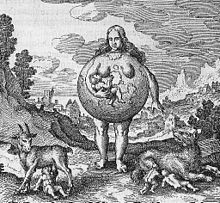Mother Nature is a common personification of nature that focuses on the life-giving and nurturing aspects of nature by embodying it ,in the form of the mother.
Western tradition history

Mother Nature image, 17th century alchemical text, Atalanta Fugiens
The word “nature” comes from the Latin word, “natura,” meaning birth or character (see nature (innate)). In English its first recorded use (in the sense of the entirety of the phenomena of the world) was in 1266 A.D.. “Natura”, and the personification of Mother Nature, was widely popular in the Middle Ages. As a concept, seated between the properly divine and the human, it can be traced to Ancient Greece, though Earth (or “Eorthe” in the Old English period) may have been personified as a goddess. The Norse also had a goddess called Jord (or Earth).
The earliest written dated literal references to the term “Mother Earth” occur in Mycenaean Greek. Ma-ka (transliterated as ma-ga), “Mother Gaia“, written in Linear B syllabic script (13th or 12th century BC).[1] The various myths of nature goddesses such as Inanna/Ishtar (myths and hymns attested on Mesopotamian tablets as early as the 3rd millennium BC) show that the personification of the creative and nurturing sides of nature as female deities has deep roots. In Greece, the pre-Socratic philosophers had “invented” nature when they abstracted the entirety of phenomena of the world as singular: physis, and this was inherited by Aristotle. Later medieval Christian thinkers did not see nature as inclusive of everything, but thought that she had been created by God; her place lay on earth, below the unchanging heavens and moon. Nature lay somewhere in the center, with agents above her (angels), and below her (demons and hell). For the medieval mind she was only a personification, not a goddess.
Greek myth
In Greek mythology, Persephone, daughter of Demeter (goddess of the harvest), was abducted by Hades (god of the dead), and taken to the underworld as his queen. Demeter was so distraught that no crops would grow and the “entire human race [would] have perished of cruel, biting hunger if Zeus had not been concerned” (Larousse 152). Zeus forced Hades to return Persephone to her mother, but while in the underworld, Persephone had eaten pomegranate seeds, the food of the dead and thus, she must spend part of each year with Hades in the underworld. Demeter’s grief for her daughter in the realm of the dead, is reflected in the barren winter months and her joy when Persephone returns is reflected in the bountiful summer months.
The Enlightenment
Enlightenment beliefs rooted themselves in reason and logic. The leaders of the Enlightenment believed that the knowledge must be widely known and must be pondered. Nature was analogous to God, however, and could not be examined. The believers and leaders of the Enlightenment had to separate nature from God. This led to the feminization of nature, the creation of the word: Mother Nature. Boyle suggested that examination of man is an examination of God. Therefore, nature had to be converted to woman, “a great…pregnant automation” to be examined.Bacon suggests that a man must inquisite truth through penetrating into these holes and corners, a sexual metaphor that feminizes nature. When nature was feminized and degraded, Carolyn Merchant suggests that it made possible for people to exploit and study it. Hence, the words “mother nature” come into play. These scientists utilized sexual metaphors to create a feminized nature —mother nature— so that it could be studied and exploited.


